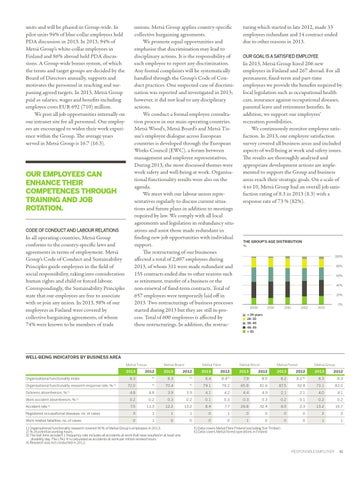units and will be phased-in Group-wide. In pilot units 94% of blue-collar employees held PDA discussion in 2013. In 2013, 94% of Metsä Group’s white-collar employees in Finland and 86% abroad held PDA discussions. A Group-wide bonus system, of which the terms and target groups are decided by the Board of Directors annually, supports and motivates the personnel in reaching and surpassing agreed targets. In 2013, Metsä Group paid as salaries, wages and benefits including employee costs EUR 692 (710) million. We post all job opportunities internally on our intranet site for all personnel. Our employees are encouraged to widen their work experience within the Group. The average years served in Metsä Group is 16.7 (16.3).
OUR EMPLOYEES CAN ENHANCE THEIR COMPETENCES THROUGH TRAINING AND JOB ROTATION. CODE OF CONDUCT AND LABOUR RELATIONS
In all operating countries, Metsä Group conforms to the country-specific laws and agreements in terms of employment. Metsä Group’s Code of Conduct and Sustainability Principles guide employees in the field of social responsibility, taking into consideration human rights and child or forced labour. Correspondingly, the Sustainability Principles state that our employees are free to associate with or join any union. In 2013, 98% of our employees in Finland were covered by collective bargaining agreements, of whom 74% were known to be members of trade
unions. Metsä Group applies country-specific collective bargaining agreements. We promote equal opportunities and emphasise that discrimination may lead to disciplinary actions. It is the responsibility of each employee to report any discrimination. Any formal complaints will be systematically handled through the Group’s Code of Conduct practices. One suspected case of discrimination was reported and investigated in 2013; however, it did not lead to any disciplinary actions. We conduct a formal employee consultation process in our main operating countries. Metsä Wood’s, Metsä Board’s and Metsä Tissue’s employee dialogue across European countries is developed through the European Works Council (EWC), a forum between management and employee representatives. During 2013, the most discussed themes were work safety and well-being at work. Organisational functionality results were also on the agenda. We meet with our labour union representatives regularly to discuss current situations and future plans in addition to meetings required by law. We comply with all local agreements and legislation in redundancy situations and assist those made redundant in finding new job opportunities with individual support. The restructuring of our businesses affected a total of 2,607 employees during 2013, of whom 311 were made redundant and 155 contracts ended due to other reasons such as retirement, transfer of a business or the non-renewal of fixed-term contracts. Total of 657 employees were temporarily laid off in 2013. Two restructurings of business processes started during 2013 but they are still in-process. Total of 600 employees is affected by these restructurings. In addition, the restruc-
turing which started in late 2012, made 33 employees redundant and 14 contract ended due to other reasons in 2013. OUR GOAL IS A SATISFIED EMPLOYEE
In 2013, Metsä Group hired 206 new employees in Finland and 267 abroad. For all permanent, fixed-term and part-time employees we provide the benefits required by local legislation such as occupational health care, insurance against occupational diseases, parental leave and retirement benefits. In addition, we support our employees’ recreation possibilities. We continuously monitor employee satisfaction. In 2013, our employee satisfaction survey covered all business areas and included aspects of well-being at work and safety issues. The results are thoroughly analysed and appropriate development actions are implemented to support the Group and business areas reach their strategic goals. On a scale of 4 to 10, Metsä Group had an overall job satisfaction rating of 8.3 in 2013 (8.3) with a response rate of 73 % (82%).
THE GROUP’S AGE DISTRIBUTION % 100% 80% 60% 40% 20%
2009
2010
2011
2012
0%
2013
< 26 years 26–35 36–45 46–55 > 55
WELL-BEING INDICATORS BY BUSINESS AREA Metsä Tissue
Metsä Board
Metsä Fibre
Metsä Wood
Metsä Forest
Metsä Group
2013
2012
2013
2012
2013
2012
2013
2012
2013
2012
2013
8.3
4)
8.3
4)
8.4
8.4 5)
7.9
8.0
8.2
8.2 6)
8.3
8.3
72.0
4)
70.4
4)
79.1
78.2
65.8
81.6
87.5
92.8
73.1
82.0
Sickness absenteeism, % 2)
4.8
4.8
3.9
3.9
4.1
4.2
4.4
4.9
2.1
2.1
4.0
4.1
Work accident absenteeism, % 2)
0.2
0.2
0.3
0.2
0.1
0.3
0.3
0.3
0.2
0.1
0.2
0.2
Accident rate 3)
7.5
11.3
12.2
13.2
8.4
7.7
26.8
32.4
6.5
2.3
13.2
15.7
Registered occupational diseases, no. of cases
0
1
1
1
0
1
0
0
0
0
2
2
Work related fatalities, no. of cases
0
1
0
0
0
0
1
0
0
0
1
1
Organisational functionality index Organisational functionality research response rate, % 1)
1) Organisational functionality research covered 90% of Metsä Group's employees in 2013. 2) % of potential working hours. 3) The lost-time accident 1 frequency rate includes all accidents at work that have resulted in at least one disability day. The LTA1 fr is calculated as accidents at work per million worked hours. 4) Research was not conducted in 2012.
2012
5) Data covers Metsä Fibre Finland (excluding Svir Timber) 6) Data covers Metsä Forest operations in Finland
RESPONSIBLE EMPLOYER 41
